Sleep is the bedrock of your health and wellbeing. Tons of studies can speak to this, as can anybody who’s ever had to slog through the day on four hours of sleep. We can chug temporary boosts like coffee or energy drinks, but these are all poor substitutes for deep, restful shuteye. Unfortunately, urgent deadlines, restless babies, jet lag, and more, have us staying up later than we should. How do we switch gears and prime ourselves to sleep better again?

Meditation could be an answer. Here at Good Night’s Rest, we’ve got a soft spot for a specific type called mindfulness meditation. Alongside other meditation techniques, we recommend mindfulness as a simple, powerful tool that can help you wind down, maintain a calmer outlook, and even manage the disruptive thought patterns that come with mental illnesses like anxiety and depression.
Wondering how to get started? Online resources have helped us cultivate our own practice, and they can help you begin yours. Check out some of our favorite mindfulness meditation blogs!
1. Mindful
Mindful’s best known for its bi-monthly flagship magazine of the same name, and its site delivers content with the same clean, thoughtful design and consistent focus. The wealth of well-presented and useful posts makes the Mindful site easy to browse and even easier to get lost in.
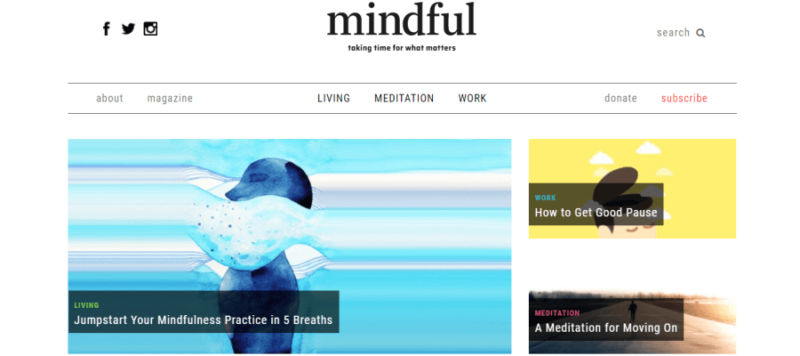
Mindful emphasizes the many ways mindfulness can improve life for you, your loved ones, and even your community. It’s all about the little adjustments that you can make and how they add up to create a more balanced life, sleep schedule included. Some people build an effective meditation practice by committing to a total lifestyle change, but that’s not the only way to do it. At Mindful, you’ll find simple, gentle ways to cultivate a practice that works for you.
Mindful is also included in our Top Meditation Blogs.
2. The Orange Dot (Headspace)
This blog supplements Headspace, a popular mobile app for meditation. (Fun fact: Headspace introduced us to mindfulness meditation!) The app itself is a great tool to keep on your mobile device, but you don’t need it to benefit from The Orange Dot’s posts.

Like the Headspace app, The Orange Dot focuses on developing a mindfulness characterized by awareness and compassion. You’ll find whole subsections about applying mindfulness to deal with topics like birth, death, work, and romantic relationships. You can even sign up for a newsletter that delivers meditation tips and guides straight to your inbox.
3. Mindworks
Like The Orange Dot, this blog supplements a mobile meditation app called Mindworks. It’s a newer entry to the online meditation space, but both the app and the blog show a lot of promise. Though the content’s still a bit sparse, the posts that are available do a good job of making meditation accessible and easy to grasp.
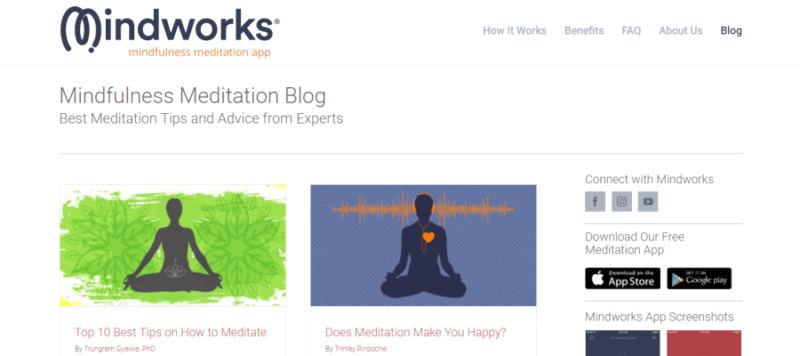
Mindworks approaches mindfulness from a more Buddhist-inflected perspective, rooting many of its principles and techniques in established Buddhist traditions. Still, Mindworks isn’t overtly Buddhist in its approach, and it remains a great resource even if you’re not particularly interested in the spiritual or philosophical dimensions of meditation.
4. Calm
Here’s our third meditation blog built to complement a mobile app. Unlike Headspace and Mindworks, Calm–both site and app–is specifically dedicated to meditation and sleep. The blog features guides and challenges to help you hone your meditation skills, as well as informative posts about the science and benefits of practicing mindfulness.
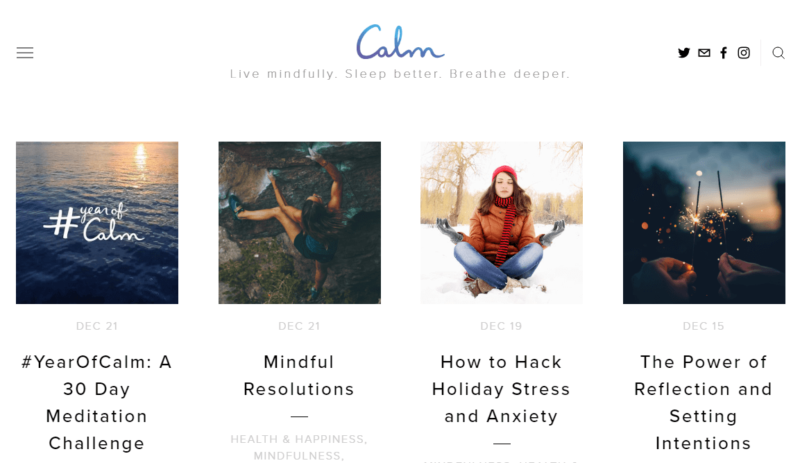
Calm’s best sections are its guided meditations and “Sleep Stories.” If you register for a free Calm account, you can access different guided meditation series, from introductions to meditation fundamentals to series designed for specific purposes like relieving anxiety or boosting the quality of your sleep. And speaking of sleep, the “Sleep Stories” are audio clips of soothing stories, ambient music, or nature sounds that are specifically mixed to lull you to sleep.
5. Mindful Minutes
Mindful Minutes is run by Melissa Eisler, author of the book The Type-A’s Guide to Mindfulness. Eisler doesn’t present herself as an expert, but rather, someone drawing from her personal experiences of sustaining mindfulness amidst a busy and demanding life. Eisler should know — not only is she a published writer, she’s also a yoga instructor, songwriter, and career content creator and strategist.
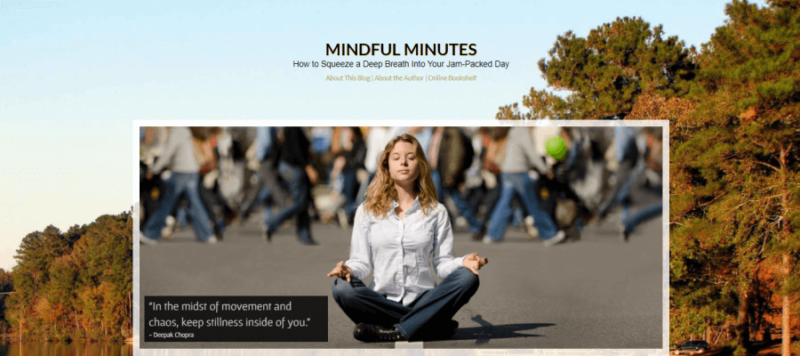
She fills Mindful Minutes with bite-sized posts that you can fit into a work break or read over lunch. Each post gives you tips and advice about living a mindful life, even when your responsibilities and commitments seem to be piling up! If you’re prone to losing sleep because it feels like there’s never enough time to do everything you need to do, maybe it’s time to give Mindful Minutes a look.
6. The Blissful Mind
The Blissful Mind is powered by wellness and mindset coach Catherine, who aims to help readers build a routine and a living environment that are more conducive to what she calls “intentional living.” Catherine’s posts are all about creating opportunities and moments of peace for yourself throughout your day, and she writes about the habits and tools that will help you do that.
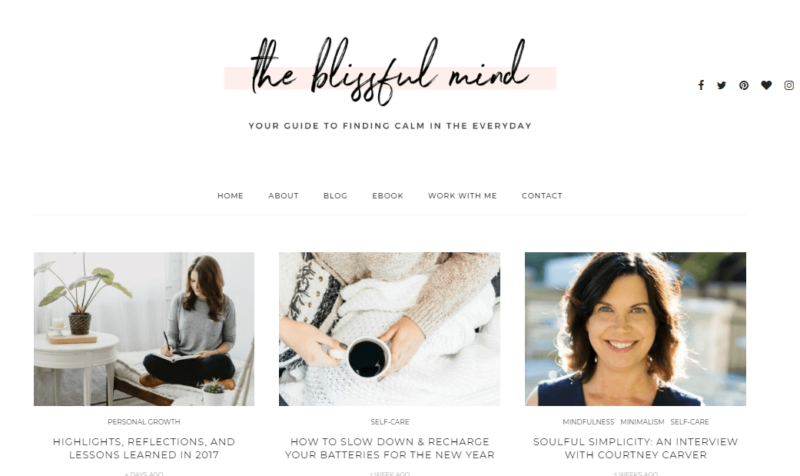
This is a great blog to read if you feel like your home life or situation can’t support a mindfulness meditation practice. Like Mindful Minutes, The Blissful Mind suggests gradual changes you can try — though in this case, it’s not just about your personal actions but how you can shape your surroundings into a more peaceful, reflective space.
7. Live and Dare
Live and Dare is another personal blog dedicated to meditation and self-improvement, this time run by meditation teacher Giovanni Dienstmann. He’s devoted years to the study of meditation, including the spiritual traditions (Buddhism, Daoism, Yoga, etc) that inform it. That said, Dienstmann’s goal is to, as he puts it, “update” these practices with findings from modern science and psychology to produce content that’s easily applicable for anyone today.
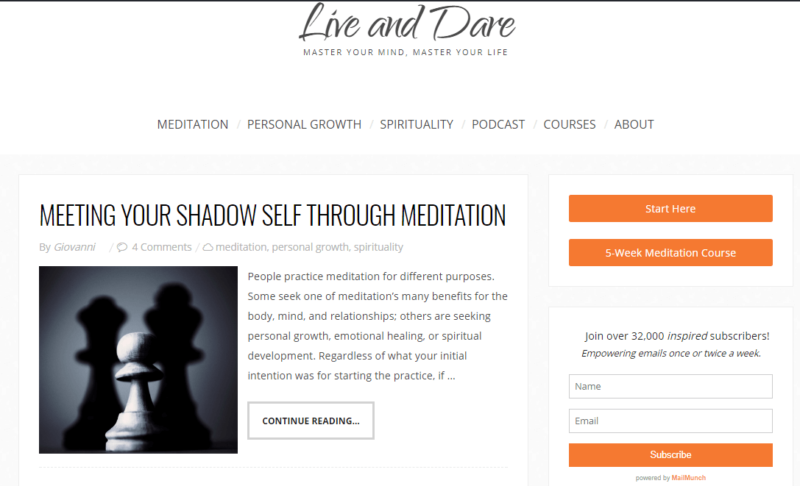
Posts on Live and Dare are organized into clear trees of categories and sub-categories, from collections of tools to common questions, techniques, and more. Guided meditations and structured courses (including introductory guides for different techniques) will help you get started, but Dienstmann’s passion and curiosity about all things meditation make this a great resource throughout the growth of your practice.
8. Deconstructing Yourself
Run by meditation teachers Michael Taft and Jessica Graham, this site bills itself as a mindfulness resource “for modern mutants.” The glib, science-y tagline encapsulates the blog’s style perfectly: Taft and Graham write conversational and candid articles about how you can use meditation in everything from love, sex, art, or major life derailments like heartbreak and disaster.
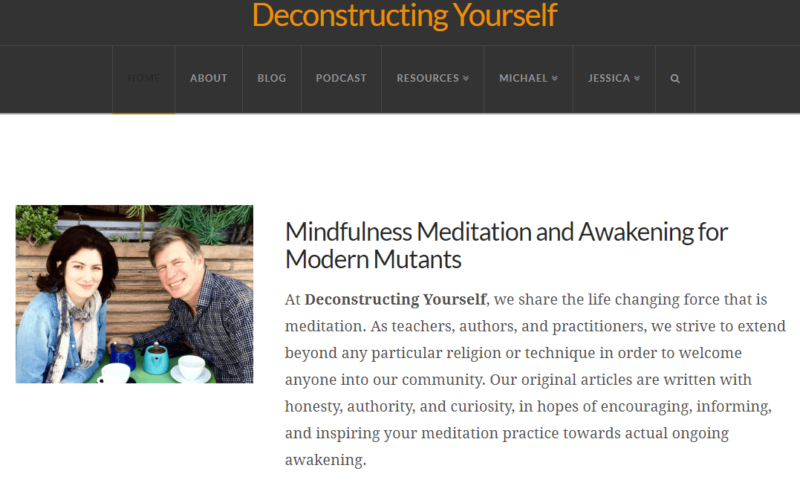
Deconstructing Yourself supplements its blog posts with a wide-ranging, interview-format podcast that brings all kinds of experts, teachers, and practitioners onboard to talk meditation, mindfulness, neuroscience, and more. If you want a casual, freewheeling take on meditation and mindfulness, give this site a try.
9. Positively Mindful
Positively Mindful features content from meditation coach Neil Morbey, who aims to bring fun and playfulness to meditation. Much of Morbey’s content tackles the emotional dimensions and uses of meditation, and his blog posts are great resources if you often find yourself lying awake at night and grappling with some stubborn emotional knots.
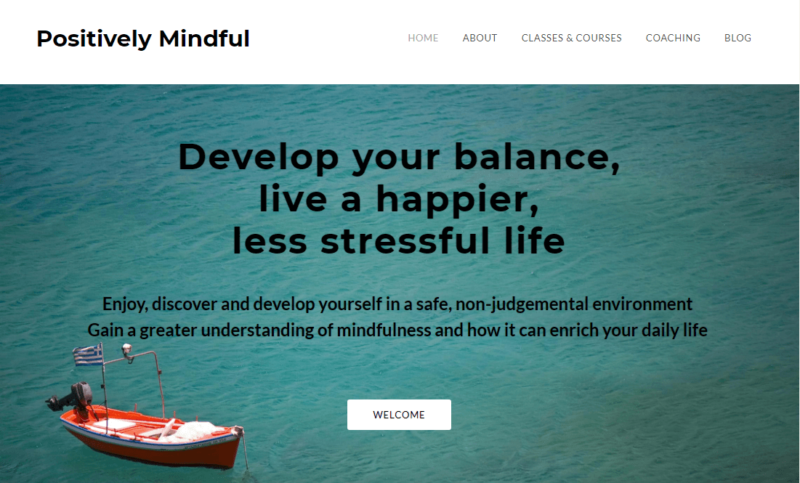
Morbey also maintains a handy page with links to useful resources, from inspiring and illuminating books to useful tools, routines, affirmations, and videos that you can use to enrich your own practice. He draws on different traditions and scientific studies to inform his discussions, but he always channels that information through his own perspective. Positively Mindful sounds like meditation advice from a warm and enthusiastic friend, though like any friend who’s geeking out, be prepared for Morbey’s posts to run a little long.
10. Stuck in Meditation
Run by Steven Hickman, director of the University of California San Diego’s Center of Mindfulness, this blog provides answers, resources, and discussion spaces for people who feel “stuck” in their meditation practice. You’ll find posts addressing common obstacles and questions, like how to meditate when you’re feeling unsettled or worried.
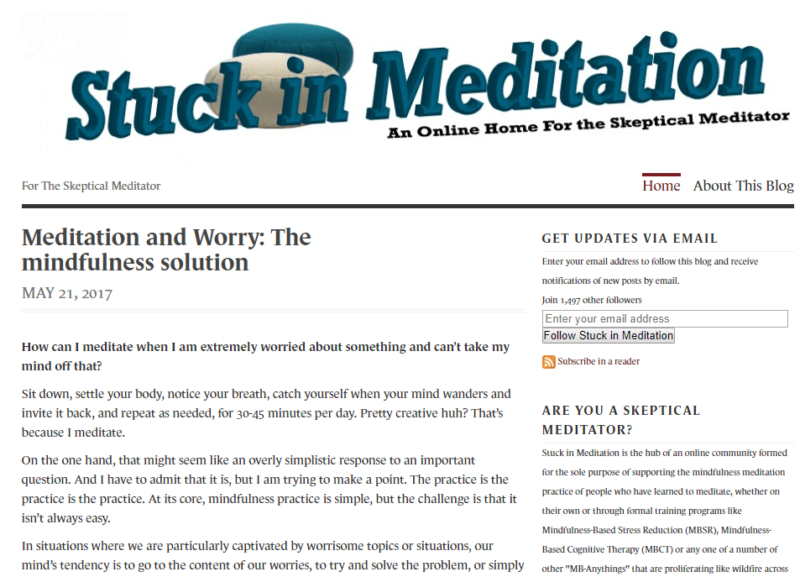
Hickman approaches meditation from a more scientific perspective, though he does use plain, accessible language. He usually suggests concrete steps you can take to work through the questions and obstacles you’re facing, as well as insightful prompts that will have you examining your practice and how it fits into your life.
11. The Mindfulness Project
The online home of a London-based mindfulness center, The Mindfulness Project takes a more scientific approach to mindfulness and meditation. There’s little emphasis on the philosophy or spirituality of meditation, with content here focusing instead on meditation’s evidence-backed benefits and its tangible, everyday effects.
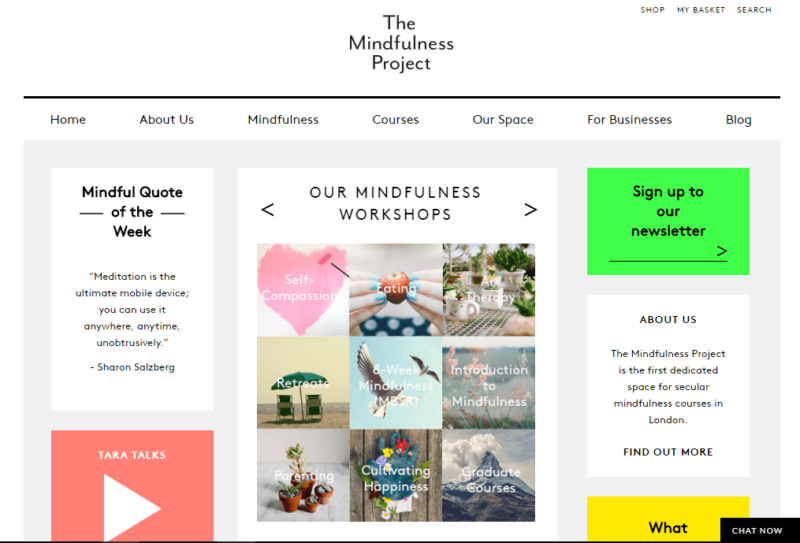
Browsing the blog yields succinct posts packed with practical tips and links to related guided meditations, as well as courses taught by the center’s trained instructors. The courses are based in the London center, but the guided meditations are typically free and available via YouTube, so even non-Londoners have much to gain from a visit to this site.
12. About Meditation
About Meditation is designed to serve as a resource specifically for creative types. The site’s blog features posts written by a diverse group of contributors, ranging from tech executives to yoga instructors to health psychologists and more. Their different backgrounds and experiences make for delightfully varied perspectives on meditation, its benefits, and ways to develop your practice.
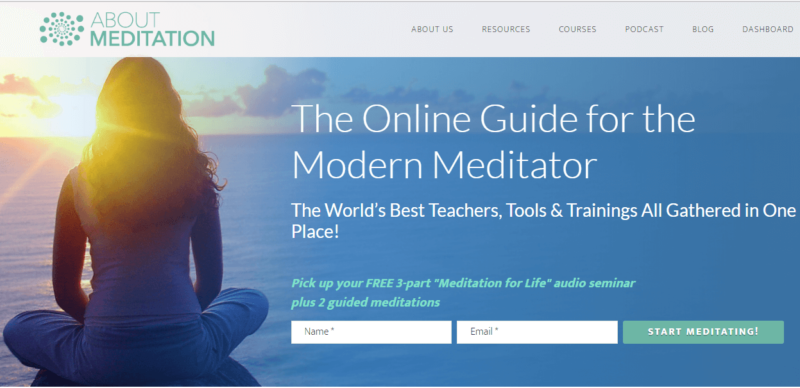
Aside from the blog, About Meditation is also brimming with content to supplement your regular meditation practice. There are mini courses and training programs to ease you into meditation, as well as a collection of resources from all over the web. The latter is divided into handy categories such as resources for beginners and for those who want to use meditation for sleep. You’ll also find the OneMind podcast, where About Meditation’s co-creator Morgan Dix interviews meditation teachers, experienced practitioners, experts, and more.
About Meditation is also included in our Top Meditation Blogs.
13. Goodlife Zen
Goodlife Zen delivers weekly practical tips and inspiration for making the most out of life, and meditation is a big part of the site’s regular coverage. Despite the name, though, the site isn’t devoted to Zen or any other particular strain of meditation, instead advocating for a general cultivation of mindfulness and awareness in your daily life.

The meditation posts discuss the practice’s many benefits and provides tips and guides to enliven your practice, though you’ll need to do a quick search to find them. What really makes the site worth a look is the community of contributors and regular readers who enrich each post with their own takes and experiences.
14. Everyday Mindfulness
Think you can’t sustain a regular meditation practice? Think again. Everyday Mindfulness is dedicated to showing you how to do just that. You’ll find posts from tons of contributors, each talking about their own experiences of cultivating mindfulness and the effects their efforts have had on their lives or particular challenges they’re facing.
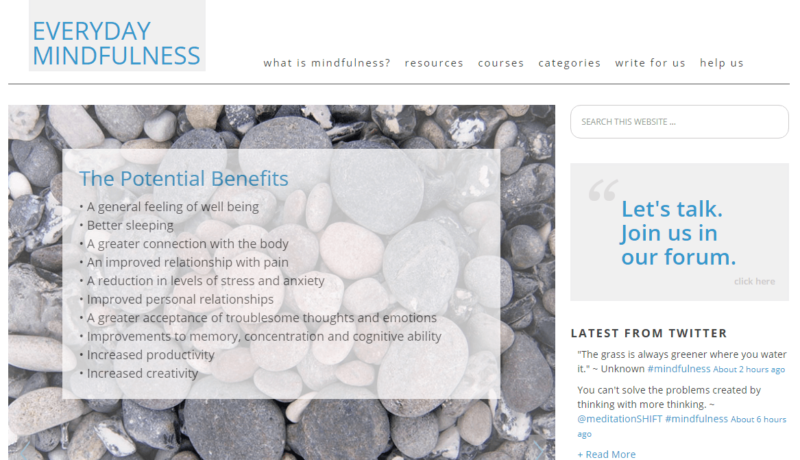
Like Goodlife Zen, Everyday Mindfulness is a great resource if you yearn for a community of like-minded people, or if you take inspiration from people’s personal accounts of their own meditation efforts. Everyday Mindfulness’ clean, well-structured site also features a forum where you can meet and talk to other readers, plus links to free resources on YouTube and elsewhere.
15. Simple Mindfulness
Simple Mindfulness is run by Paige Burkes, whose approach emphasizes how mindfulness can help you live healthy and happy. Most of her posts are structured as how-to guides with simple, practical steps you can follow. Burkes often includes free workbooks, e-books, and other resources, complete with reviews that can help you decide whether to try these for yourself.
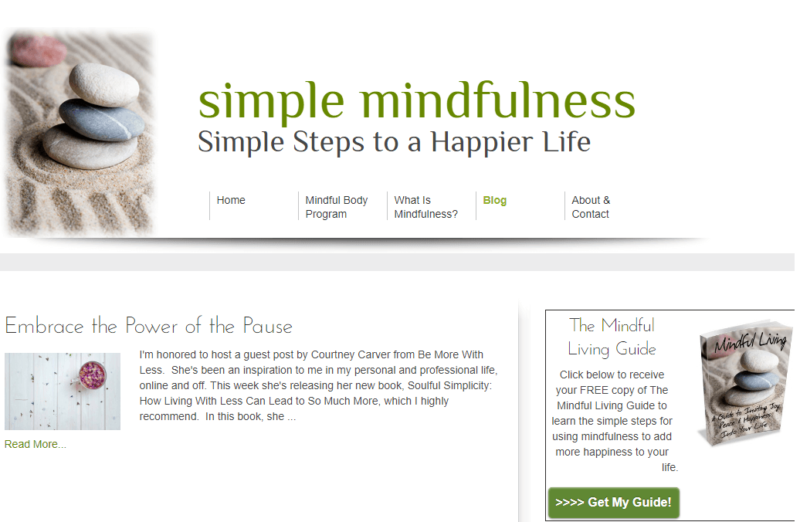
Like the other personal blogs on this list, Burkes infuses the practice of meditation with her own touch. She approaches meditation as an accessible habit that anyone can cultivate as part of their self-improvement toolkit. If you view fixing your sleep schedule as a goal that needs a holistic answer, beginning with gradual but definitive shifts in your outlook, then Burkes could be the guide you’re looking for.
16. MindBodyGreen
MindBodyGreen is another site to put on your list if you’re looking for a holistic approach to improving your sleep. This site believes in achieving happiness by improving various aspects of your life, from health to relationships, and with a whole section dedicated to it, mindfulness gets the spotlight as a valuable habit to cultivate.
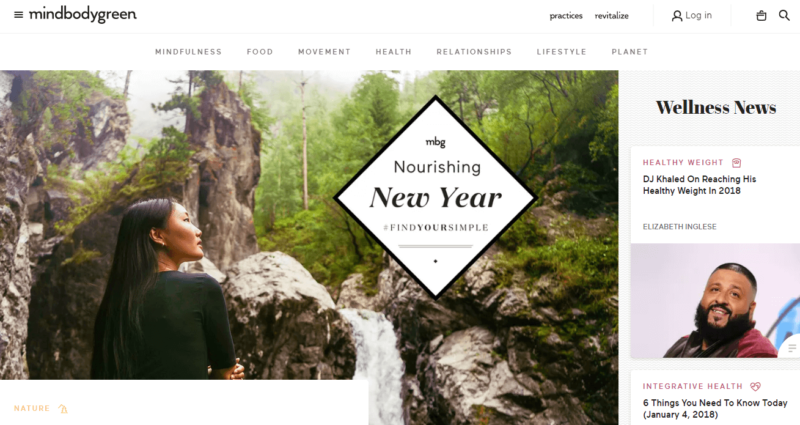
MindBodyGreen’s contributors take a personal, and occasionally spiritual, angle on mindfulness, which the site complements with guided meditations designed to be slotted into your daily routine. We like that there are three meditation teachers producing lessons and structured courses for MindBodyGreen, so you can hop from one to the other to find someone whose style suits your needs. If you’re looking to embrace big lifestyle changes to improve your sleep, then MindBodyGreen could be a fantastic resource for you.
17. Mrs. Mindfulness
Mrs. Mindfulness is run by mindfulness and yoga teacher Melli O’Brien, and it’s the place to go for weekly doses of mindfulness inspiration. She posts regular “mini-meditations” alongside articles about mindfulness-related topics, from excellent books to the latest scientific studies.
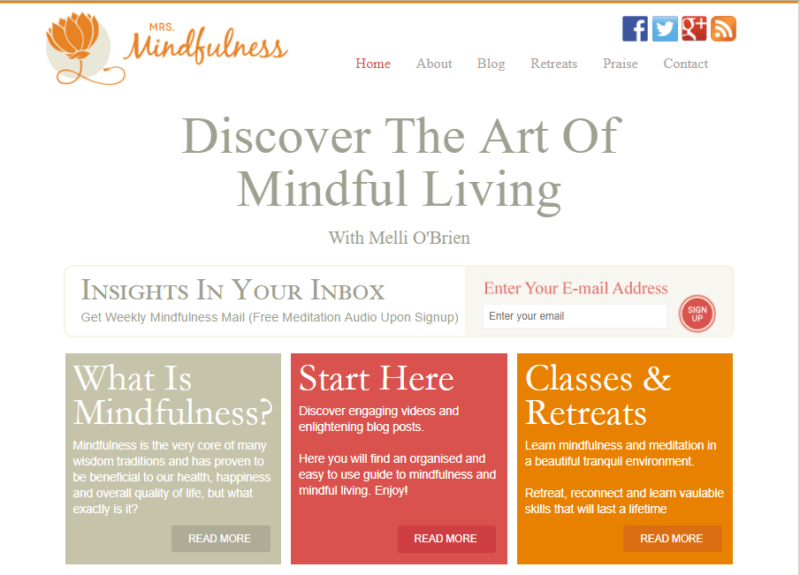
If you’re more receptive to audio-visual content, Mrs. Mindfulness should be one of your first stops. O’Brien includes a lot of free audio and video clips with her content, from audio meditation guides to fascinating TED Talks about mindfulness research. The site itself is well-organized, and quick links will take you straight to resources for using mindfulness to address specific problems like insomnia, anxiety, or stress.
18. Mindfulness Exercises
Do step-by-step or guided meditations feel too slow for you? Maybe you’ve been meditating for some time now, and you want to enrich your knowledge. Or maybe your practice has gotten dull and repetitive, and you need an assortment of routines and tools to liven things up.
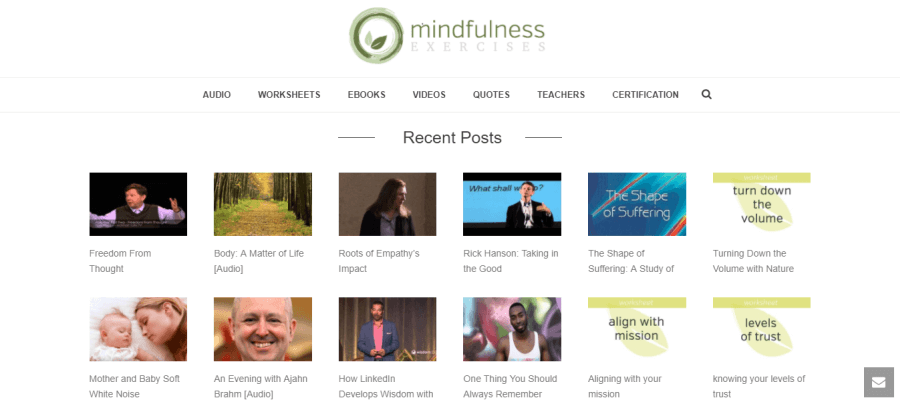
Mindfulness Exercises can help you find a way forward. True to its name, this site collects over 1,500 mindfulness meditation activities, exercises, worksheets, and tools, organized in a neat, no-frills layout that’s easy to navigate.
Beyond the extensive resource library, you can also tap into the expertise and experience of the site’s founder Sean Fargo, a former Buddhist monk. Fargo offers what he calls evidence-based mindfulness training for clients across the globe.
19. Holstee
The Holstee platform encourages people to live “more fully and mindfully,” as the site itself puts it, and the blog features posts from contributors who write about what that means and entails for them. Each month brings a new theme like “Intention,” “Compassion,” and “Gratitude,” covering 12 in all from the company’s manifesto. You’ll also find a daily newsletter designed to prompt self-reflection with quick stories and nuggets of insight from the company’s co-founders.
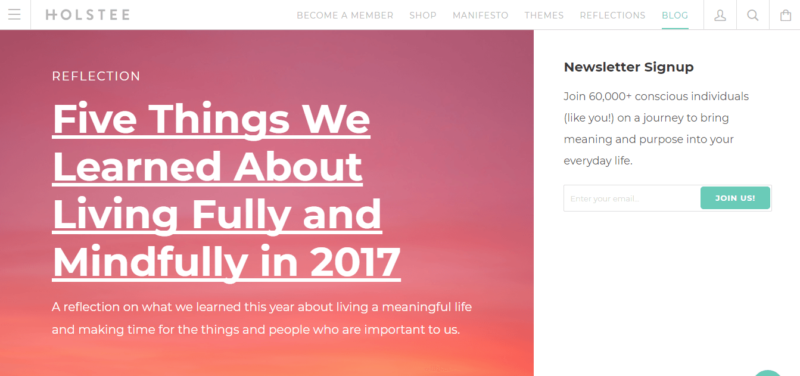
Much of Holstee nudges you towards buying items from its shop or signing up for a paid membership to gain more access to resources. However, if you’re more of a reader than a listener or viewer, and if you just want quick posts and bite-sized prompts to jumpstart your practice, you should give its blog a try.
20. Mindful Balance
Mindful Balance is run by Ireland-based Karl Duffy, a meditation enthusiast and longtime practitioner. If Holstee’s upselling nudges bother you, this is a great alternative. Every day, Duffy publishes short posts consisting of photos and quotes to help readers set intentions and themes for their meditation sessions. We like dropping by the site whenever our attention feels scattered, or when we’re at a loss for focal points on which to rest our meditation session for the day.
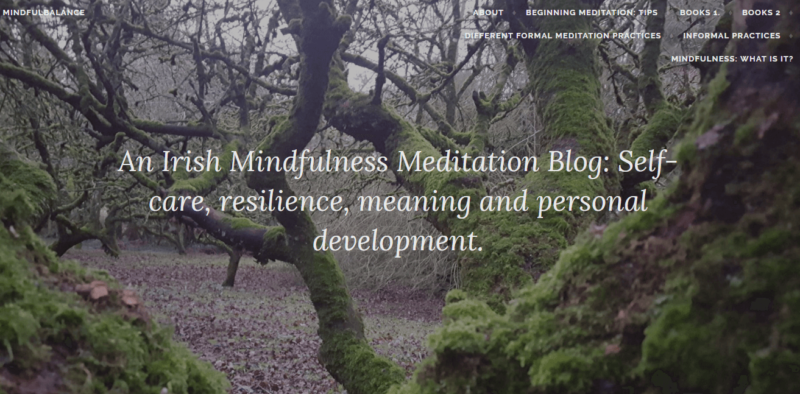
Duffy also provides good tips for beginners, an overview of popular meditation practices, as well as excellent book recommendations for readers who want to further their knowledge of meditation techniques, philosophies, and traditions. There’s also a great page on informal practices, which discusses small actions that can settle your mind over the course of your day.